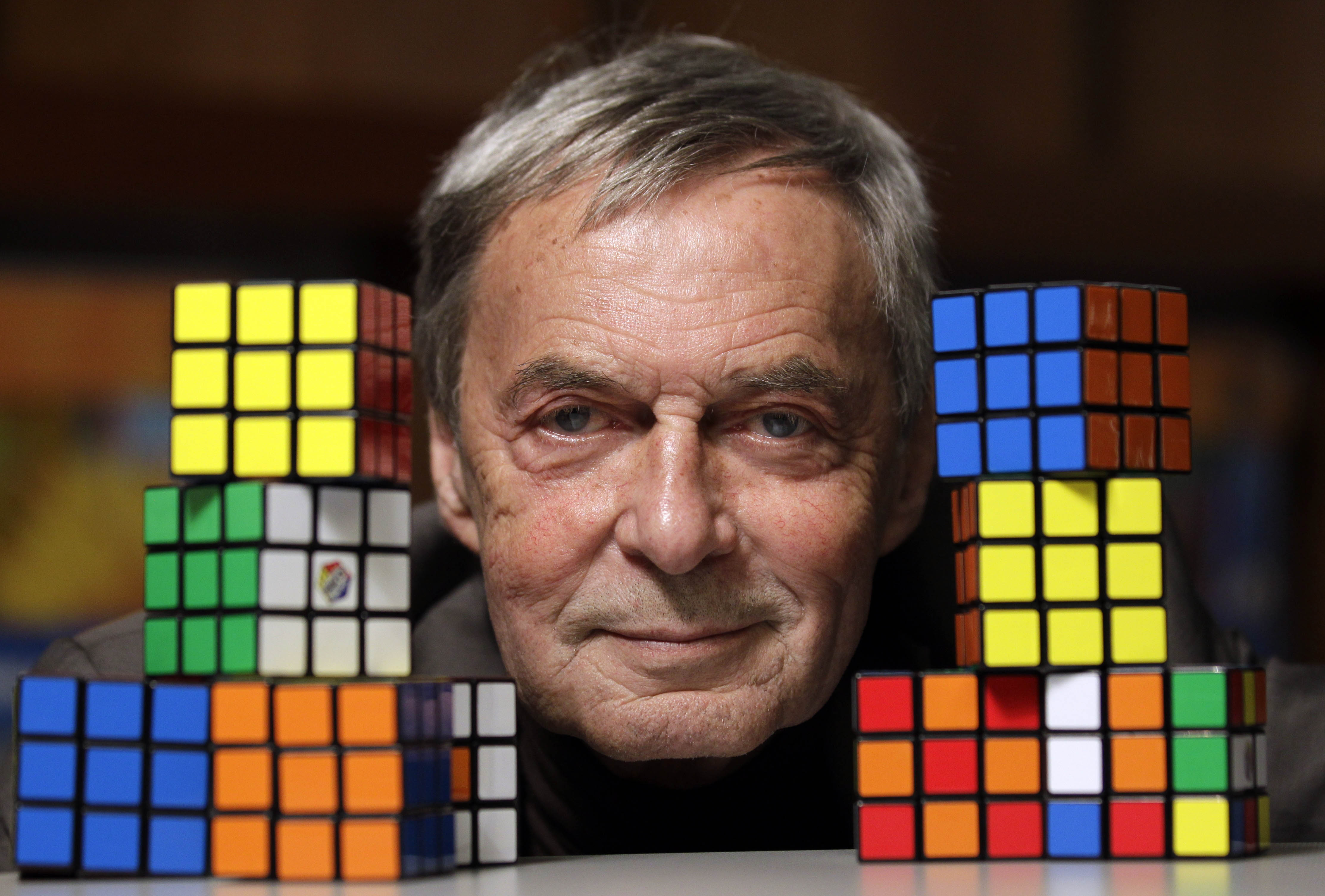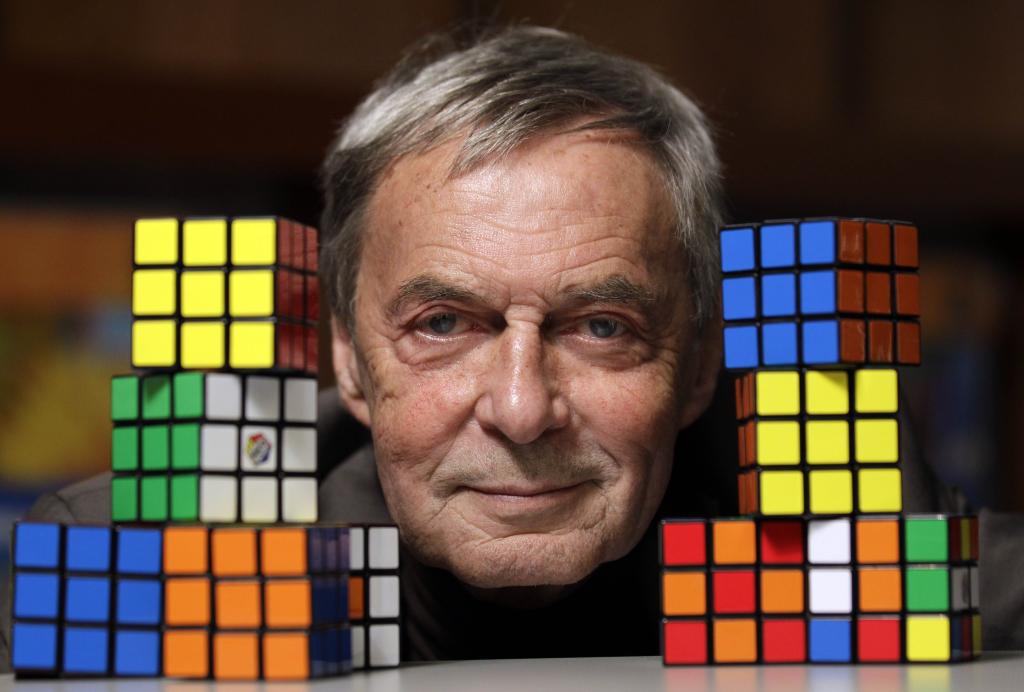
Fifty years ago, while sitting in his mother’s apartment in Budapest, Hungary, the young professor, ErnÅ’ Rubik, finally completed the prototype of the “Magic Cube”.
A teacher in the Department of Interior Design, Rubik was fascinated by geometry, but his attempts to create a solid, 3D structure with movable and interchangeable layers had frustrated him.
But after months of persistence, Rubik struck gold – not that he was thinking of any commercial opportunities. “I did it just for my own curiosity,” he told The Post in a video call. “I suppose it’s like being an artist. If you’re happy with your creation, you want to show it to people.
“You want her to like you.”
Half a century and 500 million sales later, it is estimated that one in seven people on the planet has tried to solve what has become the Rubik’s Cube, a puzzle with 43 quintillion permutations.
A cultural phenomenon, Rubik recently began counting how many magazine covers his cube had appeared on, but stopped when the number passed 1,500.
It’s not just magazines.
From appearing on “The Simpsons” six times and played by the eponymous hero in Pixar’s “WALL-E” in 2008, it’s always on our screens. Justin Bieber even tackled it on the Late Late Show with James Corden in 2015.
On Saturday, July 13, ErnÅ’ Rubik will be 80 years old.
‘Kubi loves attention, but I don’t’
The son of an aeronautical engineer who designed jet planes, he planned to pursue an academic career, until the idea of his Magic Cube came to mind and he refused to leave.
While Rubik first used his cube to teach students geometry, his invention only took off when he was granted a patent for his “three-dimensional logic toy” and a local manufacturer made 5,000 units of it.
By 1979, just two years after hitting the shelves in Hungary, the Magic Cube had sold 300,000 units, sparking the interest of international toy manufacturers. When the American company Ideal Toy bought the rights to the Magic Cube in 1980, renaming it the “Rubik’s Cube”, sales went into the stratosphere.
International toy fairs were the key to his success – and none was bigger than New York’s.
Rubik first visited NYC in early 1980 when he unveiled his Cube at the New York Toy Fair.
It was Rubik’s first trip to the West and a way to circumvent the strict Soviet-controlled export laws of his homeland. “I was always a curious child, so I knew New York from movies or magazines, but being there was completely different, especially from behind the Iron Curtain.
“The winds, the noises, the temperature — it was unlike anything I had ever experienced.â€
His visit to New York was also the first time he realized that with success, inevitably, came celebrity—and he didn’t like it.
“I never understood,” he shrugs. “Why do people want to be famous? It’s not something I wanted, but I had to tolerate it. It was very tiring.
“I’ve said it before, Cubs love attention,” but I don’t.
3.13 seconds
Today, it’s estimated that the Rubik’s Cube has sold half a billion units – and that’s not including the fakes that flooded the market.
Since the turn of the century, and through COVID, it has also taken on new life as Speedcubers turn their backs on digital devices. The World Cube Association (WCA), for example, hosts regular competitions, including the 2024 North American Championship at the Minneapolis Convention Center in Minneapolis MN on July 18-21.
The event brings together America’s best speedsters, including two-time champion Max Park. In December 2021, the 22-year-old from Cerritos, California set a new world record for completing the cube in just 3.13 seconds — or less time than it takes to read this sentence.
In comparison, when the first Rubik’s Club World Championship was held in Budapest in June 1982, the winning time, by Minh Thai of America, was 22.95 seconds.
Surprisingly, Rubik — who told The Post he can solve the puzzle in just two to three minutes — thinks Park’s time could be reduced further.
“Look at athletics and the 100-meter sprint. Just when you think they can’t go any faster, people always find a way,” he says. “It’s the same with the cube. It’s evolution. â€
Rubik also believes that his cube should be in the Olympics.
“People say the Olympics is about physical activity, but you have to remember that, yes, cube is intellectual, but it’s also physical because you need very fast hands.
“That’s why young people are good at it.”
Art and science
Fifty years later and Rubik’s view of what he calls “my son, my son” changes every day.
Just don’t ask Rubik for money.
He’s mum on how much financial gain the wildly popular Cube has earned since its inception; A spokesman told The Post that “he rarely comments on any business-related matters as his main interest has always been artistic and cultural”.
“It’s art and science, it’s about the relationship between him and people,” says Rubik.
“Every week I find something new,” he adds. “That’s what makes it so interesting, but also so difficult to understand.”
There are times when politicians can learn from Cuba, too.
“The most seemingly intractable problems can be solved if you have intellectual power,” he says. “You can’t give up just because something seems intractable.”
The secret to its enduring appeal, Rubik says, is that in an age of unprecedented technological change, where screens monopolize attention, the cube creates what he calls “a harmony in the mind, heart and hands.”
The real trick, however, is what it did for those kids who might have been smart but shy or difficult but could, to the amazement of their peers, solve the cube.
“They became superheroes,” he laughs.
#Inventor #Rubiks #Cube #turns #years #worlds #popular #puzzle #toy
Image Source : nypost.com
